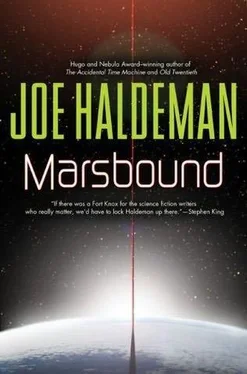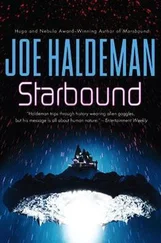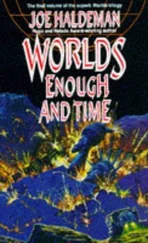“The one on Triton moves about sixty-four times as fast as they do; we move about four times as fast as it does. To match you.
“They offer this as an analogy. Suppose you humans, for some reason, had to communicate with a mayfly.”
“That’s a kind of insect?”
“Yes. Though it lives most of its life as a variety of nymph. When it becomes an actual insect, it only lives for a day. How would you go about communicating with it?”
“You couldn’t. It wouldn’t have anything like a brain, or language.”
Red grabbed his head and shook it. “Ha-ha. But this is analogy, not science. Suppose it had a quick squeaky language, and intelligence, and civilization, but it lived so fast that the span from birth to death was only one day. How would you communicate with it?”
“I see what you’re driving at. We’re the mayflies.”
He grabbed his head again. “You gave away the ending. But suppose you did have to communicate with these intelligent mayflies. To them, you are slow as sequoias. How do you get them to realize that you are also an intelligent form of life?”
“Build a machine? One that moves as fast as they do?”
“Yes, but not in one step. What the Others did was build a machine, a carbon-based biological one, that lived somewhat faster than they did—and which had the ability to build a machine faster than itself. And so on down the line.”
“Until you had one that could talk to mayflies. Humans, in this case.”
He nodded. “That’s what we are. We Martians.”
“Your only function is to communicate with us?
“I would say ‘destiny’ rather than function. We do have a life, a culture, independent of you. But humans are our reason for being.”
“So why,” I whispered, waving my hand at the music, “why all the secrecy?”
“Because I’m not supposed to be explaining this to you. To anybody.”
“We’re supposed to decode the message ourselves?”
“I don’t think you could. I don’t think even a Martian could, no matter how brilliant, unless he spent all his youth studying my language.”
“Maybe not even then,” I said. “Oz says your brain is immensely more complex than other Martians’. But why do the Others want to keep it secret?”
“I don’t know the details yet. But they’re afraid of you; of what you may become. Millions of years ago, they had trouble with a planet in a nearby system, somewhat like the Earth. Water-carbon-oxygen life. They’re frightened by how fast you act. How fast you evolve.”
“What kind of trouble did they have with this planet? A war?”
“I don’t think that would be possible. I think it was what you would call a preemptive strike.”
“So… they destroyed them?”
Red nodded slowly. “After the young planet started sending out interstellar probes. The Others’ world was relatively near—their sun was maybe a hundred times the distance from here to Neptune, what we would call a wide double-star system—so of course the Others were their first interstellar destination.”
“The young world was going to invade at that distance?”
“The Others didn’t know. But there were wars on the oxygen planet, worldwide wars, for years before they had space travel, and the Others could observe them indirectly. As we, and they, have done with you.”
“So the Others suddenly developed space travel themselves, and went off to do this ‘preemptive strike’?”
“Oh, no. They’d been exploring other planets with probes for many thousands of years. They’d been to this solar system, and others, with complex autonomous robots to gather information, deliver it, and self-destruct.”
His voice grew even lower. “As we have observed, they have considerable talent, power, for manipulating things at great distances. The tools for the preemptive strike were in place long before they decided they had to be used.”
“My God. Are they in place here on Earth, too?”
“That wasn’t clear. Sometimes the message was allusive, metaphorical… it was sort of ‘if it’s true, it’s too late for the humans to do anything about it; if not, nothing needs to be done.’ ”
“We might feel differently. We humans.”
“It also said that for the humans’ sake, the threat ought to be kept secret. Not for its own protection, it emphasized. For your sake—I think so it wouldn’t have to take action prematurely. Though my sense is the ‘action’ wouldn’t be anything like an invasion or even a launched missile. It would be a small act, like turning on the laser beacon.
My heart was hammering. “Could it destroy the Earth just like that? So casually?”
“I doubt it. And it wouldn’t want to, literally, destroy the Earth.
It said that we could have the planet if you proved unsuitable. We Martians.”
“Now that would go down really well on Earth.”
“Don’t worry. Who needs the gravity? The Others are aquatic, or whatever you call something that lives in liquid nitrogen. They don’t think about gravity any more than fish do. They just float there.”
I felt he was telling the truth. “You’re on our side.”
He nodded. “It can’t see that. Even if I was not in beghnim with you, I would feel closer to you, to all humans, than to them. The Others may be our creators, but in terms of simple existence, we are much closer to you.
“They hardly live at all, on our time scale… and technically, they never die.”
“Never? How do they manage that?”
“An individual will stop moving, stop metabolizing, for a thousand years or more. Dead except for the information structures that make up its individuality. When it’s needed again, it’s kind of… jump-started.”
“I don’t know that term.”
“It’s old-fashioned. Basically, some other individual decides it’s time, and applies enough energy to get it metabolizing again. A process that might take ares.
“So in a sense, it’s never really been dead. Though for a thousand ares or so, it’s been no more alive than data stored in a machine.”
“How many of them are out there, alive, at any given time?”
“It could be three or three trillion, I don’t know. The only one we have to worry about is the speeded-up one on Triton. The others are thirty ares away from affecting us in response to anything we do. And it would take them ages to respond.”
“If some people, a lot of people, knew what you’ve told me, they’d be declaring war on Triton. Which would do a lot of good, I know.”
“A lot of expense for nothing. The best they could do would be to send a heavily armed and automated vessel out to find a small target beneath the surface of Triton, and destroy it. But it’s impossible.”
“Not theoretically. Not if a majority wanted it badly enough.”
“I meant practically. You realize how powerful that laser would be, close-up?”
“Paul worked up some numbers. If it could be aimed and used like the American Star Wars lasers were supposed to, they would be able to vaporize any conventional space vehicle, long before it got to Triton.”
“Ha-ha.” He nodded rapidly. “But think larger. Suppose this laser is far from being the pinnacle of their technology. Suppose they had one a thousand times more powerful. Suppose it was hidden on Earth’s moon.”
“It could do some real damage, even if they stopped it pretty quickly.”
“It would be hard to stop, wouldn’t it? And in less than one day it could destroy every city in the world and set fire to all the forests and plains. The smoke would persist long enough to stop agriculture.”
“Did… did the Other threaten to do something like that?”
“No, not in so many words. It did imply that the destruction would only take one day, and from that I extrapolated various possibilities.But it was not like a threat, or a prediction.” He paused for several seconds. “It’s hard to translate the exact intent. It was presented as a theoretical possibility, almost an entertainment for the Other. Like a horror movie that could come true.
Читать дальше












